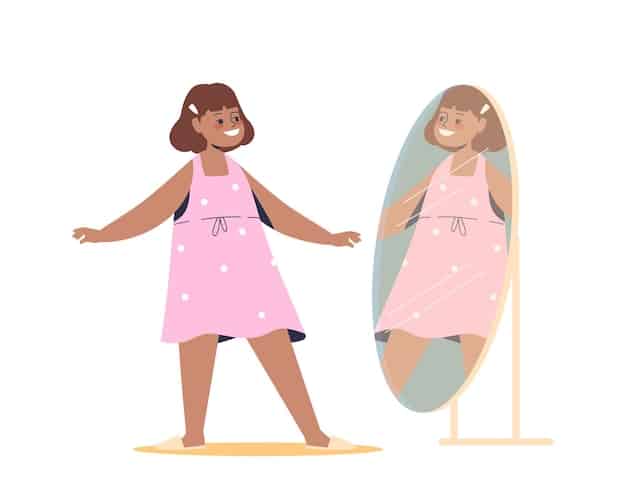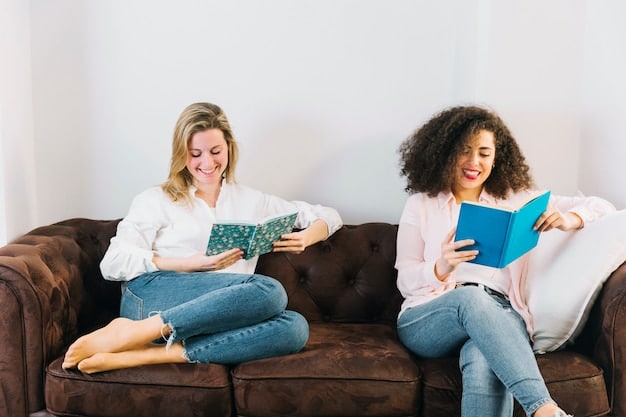Body Positivity in Relationships: Self-Love’s Foundation

Advertisements
Body positivity in relationships is about fostering a deep sense of self-acceptance and worth within each partner, influencing how individuals perceive themselves and each other, therefore creating a healthier and more fulfilling dynamic.
Navigating relationships requires a strong sense of self, and that’s where body positivity in relationships comes in. It’s about building a foundation of self-love that not only transforms how you see yourself but also how you connect with your partner.
Advertisements
Understanding Body Positivity and Its Importance
Body positivity is more than just a trend; it’s a movement that challenges societal norms regarding beauty standards. It’s about embracing your body as it is, regardless of size, shape, or perceived flaws.
So, why is body positivity crucial, especially within the context of relationships? Let’s delve deeper.
Redefining Beauty Standards
Body positivity encourages us to redefine what we consider beautiful. Instead of adhering to unrealistic ideals often portrayed in media, it focuses on health, well-being, and self-acceptance. This shift in perspective can have a profound impact on our self-esteem.
Fostering Self-Acceptance
At its core, body positivity is about accepting your body as it is today. It’s about recognizing that your worth isn’t tied to your weight or appearance. This self-acceptance is fundamental for building confidence and feeling comfortable in your own skin.
- Enhances Self-Esteem: Accepting your body boosts your self-esteem, making you feel more confident and capable.
- Promotes Mental Health: Body positivity reduces anxiety and depression related to body image issues.
- Encourages Healthy Habits: It shifts the focus from weight loss to overall well-being, promoting healthy eating and exercise habits.
In conclusion, understanding and embracing body positivity is the first step towards cultivating healthier relationships. It starts with you, with how you perceive and treat yourself.

The Impact of Body Image on Relationships
Body image plays a significant role in shaping our relationships. Our perceptions of our own bodies can heavily influence how we interact with our partners, affecting everything from intimacy to communication.
Let’s explore how negative body image can impact relationships.
Communication Challenges
Negative body image can lead to insecurity and self-doubt, making open and honest communication difficult. Individuals might avoid expressing their needs or feelings due to fear of judgment or rejection.
Intimacy Issues
Feeling self-conscious about one’s body can significantly impact intimacy. People may avoid physical touch or sexual encounters, leading to dissatisfaction and emotional distance in the relationship.
- Reduced Self-Confidence: Negative body image lowers self-confidence, making it hard to feel attractive and desirable.
- Increased Anxiety: It can cause anxiety about being seen or touched, hindering spontaneity and pleasure.
- Avoidance of Intimacy: Individuals might withdraw from physical and emotional intimacy to avoid feeling vulnerable.
Ultimately, recognizing the impact of body image on relationships is crucial for fostering healthier dynamics. Addressing these issues can lead to greater understanding, empathy, and connection between partners.
Building Self-Love as a Foundation
Self-love is the cornerstone of body positivity and a crucial foundation for healthy relationships. It’s about treating yourself with kindness, respect, and compassion, regardless of your physical appearance.
But how do you cultivate self-love? Let’s explore some practical strategies.
Practice Self-Compassion
Self-compassion involves treating yourself with the same kindness and understanding you would offer a friend. It means acknowledging your imperfections without judgment and accepting yourself as you are.
Challenge Negative Thoughts
Negative thoughts about your body can be incredibly damaging. Challenge these thoughts by questioning their validity and replacing them with more positive and realistic affirmations.

- Identify Negative Thoughts: Become aware of the negative thoughts you have about your body.
- Question Their Validity: Ask yourself if these thoughts are based on facts or unrealistic standards.
- Replace Them with Affirmations: Replace negative thoughts with positive affirmations that celebrate your strengths and qualities.
Building self-love is an ongoing journey, but it’s one that’s essential for fostering healthy relationships. By prioritizing self-compassion and challenging negative thoughts, you can create a strong foundation of self-acceptance and confidence.
Communicating Body Positivity with Your Partner
Open and honest communication is vital in any relationship, especially when it comes to body positivity. Sharing your feelings, needs, and insecurities can create a deeper connection and understanding between you and your partner.
Here are some tips for effectively communicating about body positivity.
Expressing Your Feelings
Share your feelings about your body with your partner in a vulnerable and honest way. Let them know what makes you feel insecure and what kind of support you need.
Active Listening
When your partner shares their feelings about their body, listen actively and empathetically. Show them that you care and understand their perspective.
- Be Honest: Openly share your feelings and insecurities about your body.
- Be Empathetic: Listen to your partner’s feelings with compassion and understanding.
- Be Supportive: Offer encouragement and validation to help your partner feel more confident.
Communicating body positivity with your partner can strengthen your bond and create a more supportive and loving relationship. It’s about fostering an environment of acceptance and understanding where both partners feel comfortable being themselves.
Practical Tips for Fostering Body Positivity in Your Relationship
Fostering body positivity in your relationship requires conscious effort and a commitment to creating a supportive and accepting environment. Small, consistent actions can make a big difference.
Here are some practical tips to help you and your partner cultivate body positivity.
Compliment Beyond Physical Appearance
Focus on complimenting your partner’s qualities that go beyond their physical appearance, such as their intelligence, humor, or kindness. This reinforces the idea that their worth isn’t solely based on their looks.
Practice Positive Self-Talk Together
Encourage each other to practice positive self-talk. Regularly share affirmations and positive statements about your bodies and selves.
- Focus on Qualities: Compliment your partner’s personality, skills, and achievements.
- Share Affirmations: Regularly express positive statements about your bodies and selves.
- Challenge Negative Comments: Help each other identify and challenge negative thoughts about your bodies.
By incorporating these practical tips into your relationship, you can create a culture of body positivity that strengthens your bond and enhances your overall well-being. It’s about consistently reinforcing the message that you love and appreciate each other for who you are, not just what you look like.
Overcoming Challenges and Setbacks
Building body positivity in a relationship isn’t always easy. There will be challenges and setbacks along the way. The key is to approach these obstacles with patience, understanding, and a commitment to growth.
Let’s explore how to navigate some common challenges.
Dealing with External Pressures
External pressures from media, society, and even family can undermine body positivity. It’s important to have open conversations about these pressures and support each other in resisting them.
Handling Insecurities
Insecurities can surface unexpectedly. When they do, address them with empathy and understanding. Remind your partner of their worth and beauty, and encourage them to practice self-compassion.
- Acknowledge Setbacks: Recognize that progress isn’t always linear.
- Seek Support: Talk to friends, family, or a therapist for additional support.
- Practice Self-Care: Engage in activities that promote relaxation and well-being.
Overcoming challenges and setbacks in your journey towards body positivity requires resilience and a strong support system. By facing these obstacles together, you can strengthen your relationship and deepen your commitment to self-acceptance and love.
| Key Point | Brief Description |
|---|---|
| ❤️ Self-Love | Building self-love is essential for personal well-being and healthy relationships. |
| 🗣️ Communication | Open communication about body image strengthens relationship bonds. |
| 💪 Positive Actions | Compliments beyond appearance and positive self-talk foster body positivity. |
| 🛡️ Overcoming Challenges | Resilience in facing pressures and insecurities is key to maintaining body positivity. |
Frequently Asked Questions
▼
Body positivity is a movement advocating for the acceptance of all body types. It challenges societal beauty standards and encourages individuals to love and appreciate their bodies as they are, regardless of size or shape.
▼
Body positivity fosters self-acceptance and confidence, which are crucial for healthy relationships. It helps individuals communicate openly, build intimacy, and resist external pressures that can undermine their self-esteem.
▼
Promote body positivity by complimenting beyond appearance, practicing positive self-talk together, and actively listening to your partner’s feelings. Create a supportive environment where both of you feel accepted and appreciated.
▼
Common challenges include dealing with external pressures from media, society, and family, as well as handling personal insecurities. Resilience and open communication are key to overcoming these obstacles.
▼
Build self-love by practicing self-compassion, challenging negative thoughts, and engaging in activities that promote relaxation and well-being. Treat yourself with the same kindness and understanding you would offer a friend.
Conclusion
Embracing body positivity in relationships is a journey of self-discovery and mutual support. By fostering self-love, practicing open communication, and celebrating each other’s unique qualities, you can build a relationship that thrives on acceptance, appreciation, and genuine connection.





